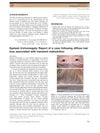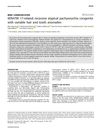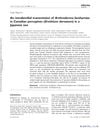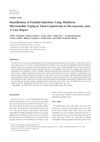 103 citations,
October 2003 in “Birth Defects Research”
103 citations,
October 2003 in “Birth Defects Research” Both genes and environmental factors like chemicals may contribute to the increase in hypospadias, but the exact causes are still unclear.
 1 citations,
January 2021 in “Advances in animal and veterinary sciences”
1 citations,
January 2021 in “Advances in animal and veterinary sciences” Pets in Egypt can pass skin fungus, especially Microsporum canis, to humans, with outdoor and young pets being more at risk.
 October 2023 in “Pediatric dermatology”
October 2023 in “Pediatric dermatology” Middle Eastern patients with epidermolysis bullosa show specific genetic mutations linked to different types of the disease.
1 citations,
January 2018 in “Advances in cancer prevention” Preventing cancer involves lifestyle changes, vaccinations, early screening, and understanding cancer's molecular basis.
 9 citations,
October 2008 in “Mutation research”
9 citations,
October 2008 in “Mutation research” N-acetyl-L-cysteine (NAC) can prevent DNA damage and protect cells from harm.
 6 citations,
March 2016 in “British Journal of Dermatology”
6 citations,
March 2016 in “British Journal of Dermatology” Low IGF-1 and high HDL cholesterol levels are linked to more hair loss in middle-aged women.
 25 citations,
August 2006 in “Human Reproduction”
25 citations,
August 2006 in “Human Reproduction” Oral contraceptives lower testosterone levels in women, especially those with certain genetic traits, and may be linked to increased breast cancer risk.
 4 citations,
July 2013 in “Journal of dermatology”
4 citations,
July 2013 in “Journal of dermatology” Malnutrition can cause unusual eyelash growth and hair loss.
 3 citations,
June 2022 in “European journal of human genetics”
3 citations,
June 2022 in “European journal of human genetics” A new type of pachyonychia congenita linked to a specific keratin gene mutation was found in two Pakistani families.
 January 2020 in “Medical journal of clinical trials & case studies”
January 2020 in “Medical journal of clinical trials & case studies” A 37-year-old male with severe skin and internal issues has a rare inherited skin condition called dystrophic epidermolysis bullosa.
 16 citations,
February 2018 in “BMC Genomics”
16 citations,
February 2018 in “BMC Genomics” Certain genetic markers linked to reproductive potential were identified by their impact on a protein's ability to bind to genes.
 15 citations,
May 1997 in “Annals of Internal Medicine”
15 citations,
May 1997 in “Annals of Internal Medicine” Tamoxifen caused hair loss in a 52-year-old woman.
 14 citations,
January 2008 in “Medical mycology”
14 citations,
January 2008 in “Medical mycology” Canadian porcupines in a Japanese zoo passed a skin fungus to each other.
 7 citations,
August 2017 in “PloS one”
7 citations,
August 2017 in “PloS one” Key genes linked to hair growth and cancer were identified in hairless mice.
 1 citations,
January 2023 in “Advances in animal and veterinary sciences”
1 citations,
January 2023 in “Advances in animal and veterinary sciences” Most cats with dermatophytosis had fungal infections, mainly caused by M. canis.
 January 2024 in “Medical mycology journal”
January 2024 in “Medical mycology journal” A mother and her two daughters got a skin infection from their cat.
 September 2023 in “Small animal advances”
September 2023 in “Small animal advances” The kitten's skin infection was cured with medication in three weeks.
 August 2022 in “International journal of research in pharmacy and chemistry”
August 2022 in “International journal of research in pharmacy and chemistry” Teak is a durable, termite-resistant wood with medicinal benefits.
 March 2021 in “Mansoura Veterinary Medical Journal /Mansoura Veterinary Medical Journal”
March 2021 in “Mansoura Veterinary Medical Journal /Mansoura Veterinary Medical Journal” Ringworm is a common, contagious fungal infection in dogs that can spread to humans and requires lengthy treatment.
110 citations,
August 2014 in “International journal of cancer” Scalp cooling significantly reduces chemotherapy-induced hair loss.
 6 citations,
May 2020 in “Nutrients”
6 citations,
May 2020 in “Nutrients” Eating fewer calories may slow skin aging and improve skin health through various biological changes.

Higher free testosterone levels can increase bone density and decrease body fat but may raise the risk of prostate cancer, hair loss, and benign prostate enlargement.
January 2024 in “IntechOpen eBooks” Honeybees face serious threats from various diseases, but beekeepers use several methods to manage and control them.
82 citations,
May 2010 in “PLoS neglected tropical diseases” Secondary syphilis in Cali, Colombia, shows high Treponema pallidum presence and challenges in early diagnosis, needing better public health strategies.
37 citations,
August 2019 in “Frontiers in Microbiology” Staphylococcus epidermidis A/C strains are more antibiotic-resistant and infection-adapted, while B strains thrive in hair follicles.
March 2025 in “Nature Communications” NSC167409 can effectively inhibit the virus causing hand, foot, and mouth disease.
 29 citations,
October 2020 in “eLife”
29 citations,
October 2020 in “eLife” Higher testosterone levels can increase the risk of certain diseases like type 2 diabetes in women and prostate cancer in men, but can also protect against autoimmune diseases and hair loss. It also affects body fat and bone density.
7 citations,
September 2021 in “Antimicrobial Agents and Chemotherapy” Olorofim effectively treats fungal skin infections.
 2 citations,
May 2022 in “Cosmetics”
2 citations,
May 2022 in “Cosmetics” Further research is needed to understand how the microbiome affects hair loss in Alopecia Areata.
 2 citations,
September 2020
2 citations,
September 2020 Long-term high testosterone levels can improve bone density and reduce body fat but may increase the risk of prostate cancer and high blood pressure.























